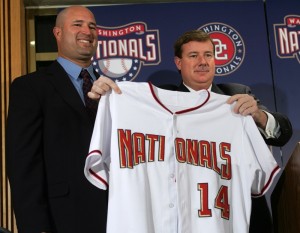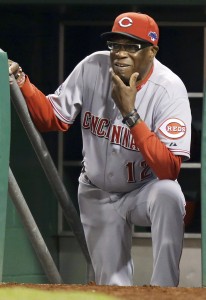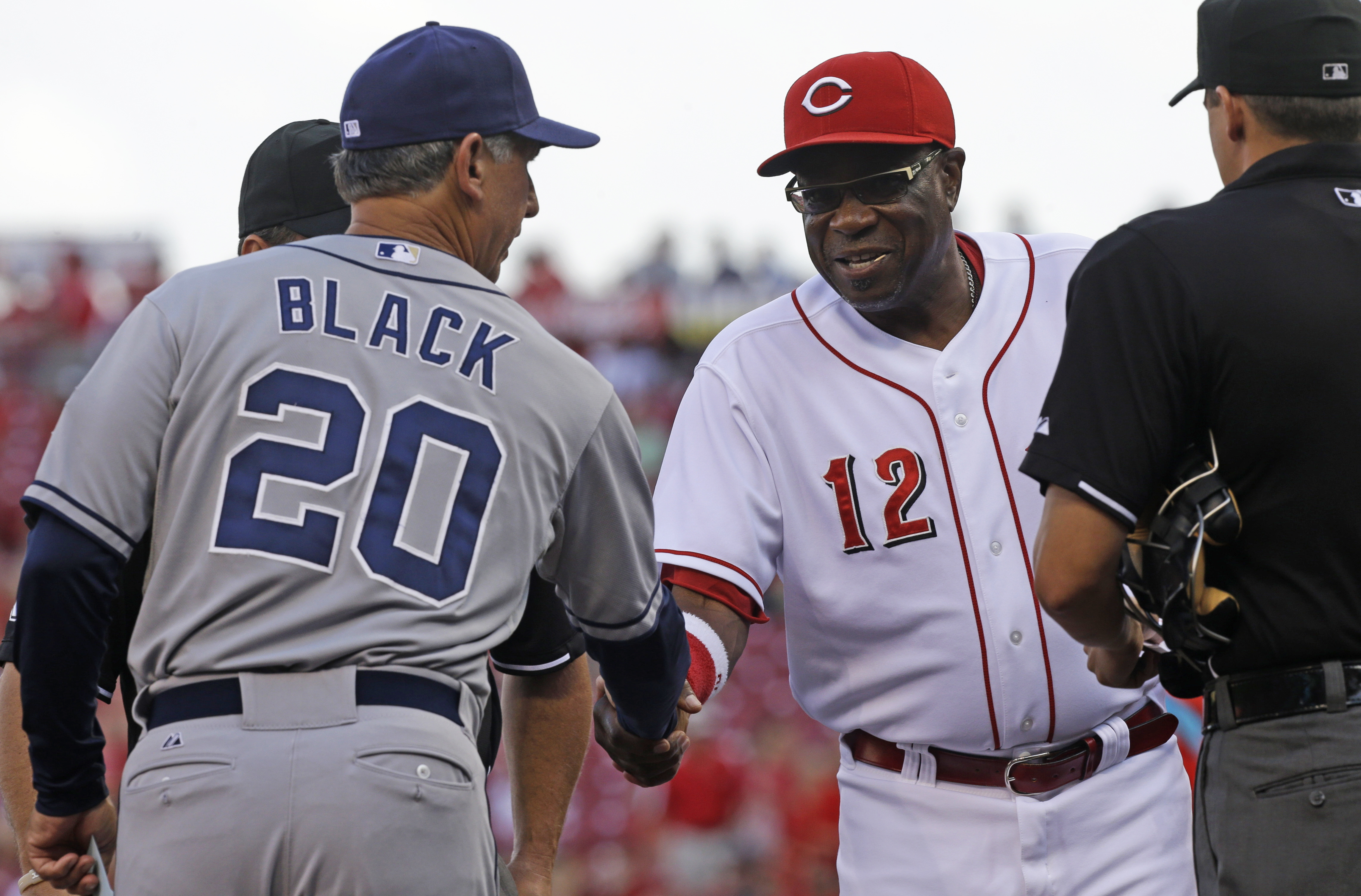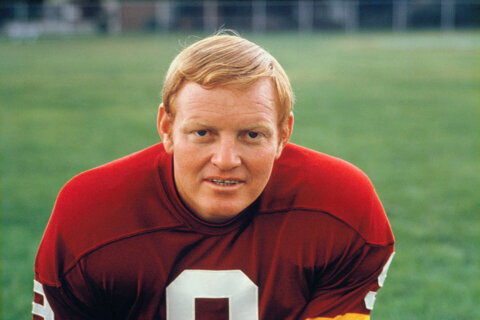WASHINGTON — Wait, does that dateline not read “ASHBURN, Va.?” Are you sure? Could this level of dysfunction from a D.C. sports team come in colors other than Burgundy and Gold?
It can, and did this week, and was on display for the nation to see. Regardless of what you think of the end result of having Dusty Baker as the new manager of the Washington Nationals (more on him later), the process by which that came about shed light on the fundamental cracks in an organization that has already wasted the first four seasons of its competitive window.
To recap: Bud Black was offered the Nationals managerial job last Wednesday, without a concrete salary in place. When that offer came, it was for a shocking one year and $1.6 million; two fewer years than the crop of rookie managers outside D.C. were offered a couple of years ago, despite Black’s eight years of Major League experience. Team ownership would not budge above two guaranteed years, the same week that Don Mattingly was handed a four-year, $10 million contract by the notoriously cheap Jeff Loria in Miami.
The two sides could not reach a deal. The Nationals, instead, made a two-year offer to the runner-up in the hiring process, Baker, who signed on and will be announced as the team’s new manager Thursday morning at Nationals Park.
How could a team that shelled out $210 million for a starting pitcher they arguably did not need last offseason fail to come close to an appropriate deal for their most important vacancy this year, one that would cost them a minute fraction of that amount?

As it turns out, this isn’t the first time. Former Nationals GM Jim Bowden said on his MLB Network Radio show on SiriusXM Tuesday that the baseball operations staff wanted to hire Joe Girardi to be the manager, but that ownership wasn’t willing to pay, and the team ended up with Manny Acta instead. The Yankees have gone 735-561 (.567 win percentage) under Girardi, including the 2009 World Series title. The Nats went 158-252 (.385) under Acta, who was fired halfway through that ’09 campaign.
In today’s baseball economy, a win on the open free agent market is worth somewhere upward of $7 million in terms of Wins Above Replacement. As we’ve seen over the past two years under Matt Williams, a manager can have enough of an impact to sway a handful or two of his team’s 162 games through his game management. No manager is currently making more than $5 million a year (a mark shared by the Cubs’ Joe Maddon, the Angels’ Mike Scocia, and the Giants’ Bruce Bochy). So it stands to reason that one place it makes absolutely no sense to skimp financially is on a manager who, even if he tilts just a couple games in your favor, would appear to be well worth his salary.
But the Lerners continue to show that whatever financial acumen they have which led to success in other industries do not apply in the baseball world. And they continue to fail to let those who do understand these things, namely general manager Mike Rizzo, do his job.
Washington Post writer Barry Svrluga detailed in his book that the Lerners attempted to nix Rizzo’s 2013 deal with the Detroit Tigers for starting pitcher Doug Fister, because they liked one of the prospects that would be shipped out, Robbie Ray. Rizzo, reportedly, threatened to quit if ownership did not allow the trade, which was hailed nearly unanimously as a steal for the Nationals at the time, and supported as such over the past two years. Eventually, the Lerners relented and Fister won 16 games his first year in Washington while the three players involved in the trade have amassed -0.9 combined WAR since.
One has to wonder how Rizzo feels about the debacle that taken place this week. In his scathing column Tuesday, Adam Kilgore wrote that the Lerners “still lack an understanding of how to treat people within their industry.” This has extended deep into the front office, where nearly every high-ranking executive with any experience working in Major League Baseball has been replaced by one with none over the past two years.
Kilgore also mentions that Rizzo has not been returning texts or emails. Considering his own well-respected assistant general manager, Bryan Minniti, left the organization in a lateral move to the same position with the Arizona Diamondbacks a year ago, it’s at the very least a reasonable question to ask just how much longer Rizzo will be willing to tolerate having the rug swept out from underneath him. This is his final guaranteed year under his current deal, with the team holding options for 2017 and 2018.

As a result of this latest snafu, the Nationals have been left with Baker at the helm, which may seem like a stroke of fortune given the poisonous way the week’s events have unfolded. On Tuesday, my colleague Dave Johnson wrote, in fact, that Baker may not have been the Nationals’ first choice, but that he was the right one. This is the part where I will respectfully disagree.
Those that lean upon Baker’s .526 career winning percentage (1,671 wins, 1,504 losses) seem to conveniently overlook the abundant talent he has been blessed with his entire career.
In San Francisco, Baker arrived alongside Barry Bonds, who was the best hitter in the Major Leagues over the next 10 seasons (averaging a .311/.461/.664 slash line with 44 home runs and 24 stolen bases), but made the playoffs just three times and past the Division Series just once. When in Chicago, he had sparkling young aces Mark Prior and Kerry Wood to go with Sammy Sosa and Moises Alou in the lineup. He never won more than 90 games, never made the World Series.
In Dusty’s first year in the Queen City, he had Joey Votto, Ken Griffey Jr., Adam Dunn and Edwin Encarnacion in the lineup. That team, with Edinson Volquez and Johnny Cueto both in the rotation the full season, won all of 74 games.
In fact, in their first season after Baker left, his three prior teams — the 2003 Giants, the 2007 Cubs and the 2014 Reds — combined to go 261-225, a better winning percentage (.537) than they did while he was there. The Giants won 100 games and returned to the playoffs. The Cubs bounced back from a 96-loss season under Baker to win the NL Central in consecutive years.
For the third time in four stops, Baker will inherit one of the best players in baseball, in his prime.
Some of the questions of Baker’s history of mismanagement of young pitching arms seem to have been answered. But his doggedly retrograde view of on-base percentage and walks “clogging the bases,” as well as his rigidity in using closers only in their designated role, are even more reactionary views than those of Matt Williams (whose winning percentage, for what it’s worth, was .552). Is there any reason to believe Baker will get better results with Bryce Harper and company?
The only real winners here are Baker himself, who has been out of a job for two years and is lucky to get another one, and Major League Baseball. With Black’s impending hiring, they were poised to be without an African-American manager for the first time in 28 years. The league will at least be spared its own debacle. Baker’s hiring makes for good optics, at least.
But of course, that’s the point. The only manager that would gladly accept an offer after what just happened to Black is one that doesn’t have any other options. Baker’s already been given three golden chances to win, and hasn’t done so. He also has been just fine in the regular season, making him about the safest, least-inspired hire possible.
It says something that the Nationals should consider themselves lucky to have him.






